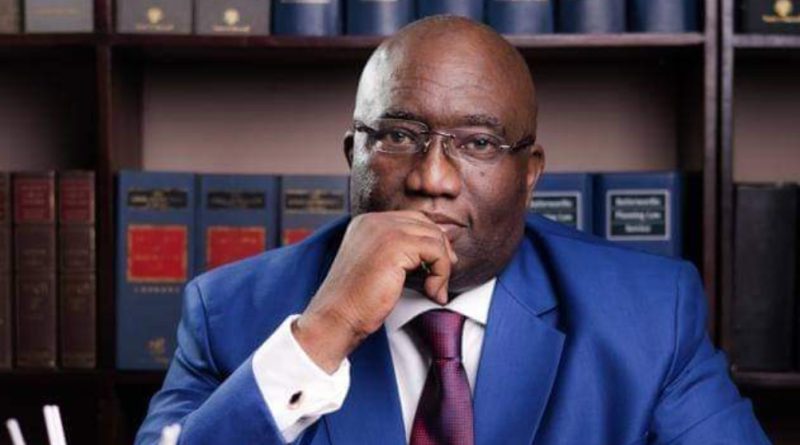Ghanaian Good Leadership Pilot, Joe Ghartey: Steering Ghana Towards Economic Progress
By Emmanuel Daudu
Leadership is a critical factor in the trajectory of any nation’s development. It is the backbone upon which the values, policies, and progress of a country are hinged. In Ghana, a nation cradled within the heart of West Africa, many individuals have risen to the mantle of leadership, contributing to its growth and stability. One notable figure that stands at the forefront of exemplary leadership is Joe Ghartey – a distinguished politician, legal luminary, and former Attorney General of Ghana.
Joe Ghartey’s tenure as a public servant and leader echoes with acts of integrity, dedication, and visionary foresight. Ghartey, born on 15th June 1961, has been a prominent figure in Ghana’s political sphere, primarily as a member of the New Patriotic Party (NPP). His foray into politics was propelled by a solid background in law, having served as a Barrister and Solicitor for considerable years before venturing into the political arena.
His ascension to leadership roles in government, notably as the Attorney General and Minister of Justice from 2006 to 2009, demonstrates his competence and dedication to public service . As Attorney General, Ghartey pursued reforms within the legal system and was instrumental in the enactment of several pieces of legislation that strengthened the judiciary and democratic governance in Ghana.
Under his leadership, Ghana experienced remarkable improvements, such as the promulgation of the Whistleblower Act, 2006 (Act 720), which provided a framework for the protection of individuals who report corrupt practices – a testament to Ghartey’s commitment to transparency and accountability.
Furthermore, Ghart’s role as the Minister for Railways Development from 2017 has been marked by notable strides in reviving Ghana’s railway sector, which had been neglected for years. His dedication to this cause is illustrated by projects aimed at expanding and modernising the rail network which is essential for bolstering economic growth and interconnectivity.
Joe Ghartey’s belief in the principles of good governance is evident in his approach to leadership. His emphasis on ethical standards, responsibility, and the rule of law has made him a respected figure among his peers and the citizens of Ghana. Ghartey’s role in ensuring that legal and political institutions uphold justice and provide equitable services to the populace has further highlighted his reputation as a proponent of good governance.
In the political domain, Joe Ghartey has displayed an unwavering commitment to democratic values, often engaging in policy discourses and legislative debates with civility and respect for divergent views. Such a temperament is crucial in a political climate that requires leaders to constructively build consensus and navigate the complexities of governance while being responsive to the needs and aspirations of their constituents.
The socio-economic development of a nation is a collective result of its leadership’s policies and initiatives. Joe Ghartey’s contributions in this area are marked by the strategic development projects he has supported. For instance, his involvement in enhancing Ghana’s transport infrastructure has not only created job opportunities but has also laid the groundwork for long-term economic progress.
Through educational initiatives and support for local entrepreneurship, Ghartey advocates for the empowerment of the youth, recognising their pivotal role in shaping Ghana’s future. By promoting policies that drive innovation and skill-building, he aids in equipping the younger generation with the tools necessary to thrive in a globalised economy.
While Joe Ghartey’s leadership has garnered praise, it is not without its challenges and criticisms. Some detractors questioned the pace and scale of the developments in the railway sector, citing delays and budgetary issues. Additionally, as with any political figure, Ghartey has faced scrutiny regarding political decisions and alignment with party positions that may not always resonate with the broader populace.
These challenges are not uncommon in the realm of leadership and arguably serve as a litmus test for a leader’s resilience and capability to adapt to the ever-changing dynamics of governance.
Evaluating the impact of Joe Ghartey’s leadership in Ghana reveals a multifaceted legacy characterised by a strong commitment to public service, ethical governance, and socio-economic progression. Ghartey’s efforts in promoting transparent legal practices, spearheading development projects, and championing good governance are indicative of his dedication to Ghana’s advancement. While leadership inevitably encompasses confrontation with challenges and criticism, what distinguishes an effective leader is the ability to persevere, innovate, and engender positive change.
Joe Ghartey’s journey contributes significantly to the narrative of Ghanaian leadership and presents a benchmark for aspiring leaders. It is through the lens of such trailblazers that the next generation can envision the possibilities of good leadership and its transformative potential for Ghana and, by extension, for Africa as a whole. Thus, the saga of Joe Ghartey’s leadership persists as a guiding light, illuminating the path towards a prosperous and just society.
The appointment of a new chairman to the Ghana Revenue Authority (GRA) is a significant event, one that holds the promise of invigorating the nation’s revenue mobilisation efforts and putting Ghana on a steadier fiscal path. In recent years, Joe Ghartey has emerged as a prominent figure tipped for such a role. As the Chairman of the Board of the Ghana Revenue Authority, Ghartey’s wealth of experience and notable track record in public service present a unique opportunity for the Authority to achieve remarkable strides in its mandate to collect and administer taxes on behalf of the Government of Ghana.
Ghartey’s chairmanship would herald an era of improved tax collection and compliance. With his legal expertise, Ghartey is well-suited to oversee the strengthening of the legal framework within which the GRA operates, ensuring that tax laws are enforced fairly and consistently. Enhancements in tax compliance could result from adopting innovative approaches to tax education, leveraging technology to simplify and automate tax processes, thereby making it easier for taxpayers to fulfil their obligations.
A significant challenge facing the GRA is efficiently taxing Ghana’s vast informal sector. Ghartey’s leadership would play a pivotal role in devising strategies tailor-made for this economic segment. By exploring methodologies that have proved successful in similar economies, such as simplified tax regimes and the implementation of presumptive taxes, Ghartey would steer the GRA towards maximising revenue from the informal sector.
Tax evasion and fraud continue to be critical issues impeding the GRA’s efficiency. Ghartey’s track record as Attorney General suggests a firm resolve in adhering to and upholding the law. Under his chairmanship, it is conceivable that the GRA would intensify its efforts to detect and deter tax evasion, by investing in enhanced investigative capacities and adopting robust forensic accounting practices to trace and recover lost revenues.
The global shift towards digital economies posits the digitalization of tax services as an inevitable step. Ghartey’s chairmanship would accelerate this progression by embracing digital solutions that provide transparency, reduce corruption, and increase efficiency in revenue collection. The potential for these systems to disrupt traditional bottlenecks and to allow for real-time tracking of revenues would be transformational for the Authority.
As Chairman, Joe Ghartey would also be poised to address administrative inefficiencies within the GRA. Streamlining operations and improving coordination among various departments would result in significant cost savings and capacity building within the organization. Such administrative reforms might include talent development programs to ensure that GRA personnel are equipped with the modern skills required to manage the complexities of contemporary tax systems.
The potential impact of Joe Ghartey’s chairmanship on the Ghana Revenue Authority could be substantial and far-reaching. By leveraging his extensive experience in law and governance, he would spearhead initiatives that would not only improve revenue collection and compliance but also enhance the GRA’s overall efficiency and reputation.
Ghartey’s potential achievements as the Chairman of the Board will be the catalyst that the GRA requires to fulfil its potential as a world-class revenue mobilization authority, thus contributing to the economic stabilization and growth of Ghana.
Written by Emmanuel Huleji Daudu
Editor-In-Chief,
Africa Security Investigation News,
Global Founder,
World Sustainable Development Goals Organization




